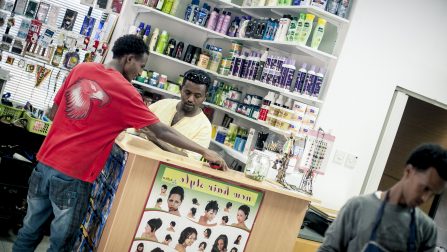An Eritrean barber in Msida
Located on one of the town corners in Msida there is a bustling unisex hairdressing salon, a colourful and social meeting point for discussing the latest hair trends and the odd town gossip. The salon belongs to 34-year-old Abdul who started as a hairdresser in his country of origin, Eritrea. What had originally started off as a hobby, developed into a passion as the ambitious teenager began working part-time in a local barbershop in his hometown after school hours.

At the barber shop
In Eritrea, it is compulsory to join the army, in accordance with the laws and state policy of national service. Persons over eighteen years of age are forcibly conscripted into national service for an indefinite period of time. Career paths are for many at the discretion of the Eritrean government. Like all other Eritrean citizens, Abdul did not know how long the government wanted him to serve in the army, which interrupted his dreams of having a normal life. . As Abdul stated “I could not follow my profession since a person’s career is dictated by the government… I was not allowed to say anything.” . There have been many reports of abuse and use of severe force against anyone who disobeyes the orders of the Government and the army – Abdul felt he had no option but to flee the country.
Having been in Malta since 2005 and granted international protection, Abdul’s idea to open a salon came to him when he showed up for a scheduled appointment at a local hairdresser . When Abdul entered the salon, the hairdresser refused to cut his hair and Abdul was turned away being called “an unwanted immigrant”. Abdul could not understand how anyone working in a hairdressing salon could refuse to give a service to a client, and these thoughts spurred him to generate a business plan that catered for all. As Abdul remarked: “I do not discriminate against anyone, no matter what his or her ethnicity is,” The negative experience Abdul went through gave him the will and determination to follow what he believed in, which was business based on equality.
Abdul also noticed that salons in Malta tend to close at 7pm so he came up with the idea of extending the working hours, catering for those who work late. This business plan was quickly put into action and Abdul made a conscious effort to learn the Maltese language, an asset that helped him set up business on the island. In 2012 his hairdressing salon dream became reality, naming it after his daughter ‘Sabrine’.
The first year of business was not easy, it took time for Abdul to establish a clientele but in the second year, his advertising strategy and word of mouth did the trick. Abdul has since employed three part-timers and offers his services to a variety of clients from different nationalities and backgrounds. Apart from hairdressing, he also imports Eritrean and Ethiopian traditional clothing and beauty cosmetics, travelling regularly within other European countries to establish business networks. As other beneficiaries of protection in Malta he has a right to a travel document valid within the EU.
“The secret to success is to strive to keep a constant good service…location is also important, you have to be clever and place yourself strategically,” Abdul said. Having opened up his shop in a central location, people who once walked past Abdul’s salon are now his clients. He continued by saying that “when I see people happy with the service I provide for them, it makes my happy”. Abdul also has plans in the pipeline to open up another business, an ethnic restaurant serving Eritrean, Somali as well as Sudanese food.
Abdul may be among the few refugees in Malta who took the risk to embark on their own business initiative.
Abdul now feels more integrated within the community, but over and above that it has given him a sense of empowerment.
“Some refugees in Malta are reluctant to invest their time and money to opening a business because they may have plans to leave Malta, and do not want the commitment,” Abdul commented, highlighting the importance of making the most of his time in Malta and encouraging others to do the same. Abdul does not want time to pass by without having achieved his goals. “I see so many refugees like me who stay in Malta waiting to leave but before they know it, they remain in Malta for years and would not have achieved the things they wanted to.” His advice to others would be to explore the possibilities around them, and not to be afraid of taking the leap.
Share on Facebook Share on Twitter